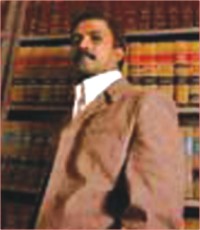| Interview
In conversation with Professor Asif Nazrul
Rezaur Rahman
 Professor Asif Nazrul is my teacher in the Department of Law, University of Dhaka. He is a role model for many of us in the department. Students feel comfortable to interact with him on matters relating to their academic and extra academic activities just as much as they want to attend his classes. He is an amiable person in personal life. These days we also find him attending various talk shows and seminars as a resource person where he offers his valuable suggestions regarding nationally important matters. Professor Asif Nazrul is my teacher in the Department of Law, University of Dhaka. He is a role model for many of us in the department. Students feel comfortable to interact with him on matters relating to their academic and extra academic activities just as much as they want to attend his classes. He is an amiable person in personal life. These days we also find him attending various talk shows and seminars as a resource person where he offers his valuable suggestions regarding nationally important matters.
Despite his busy schedule, Prof. Asif Nazrul managed to find some time to talk with the writer. The excerpts are given below.
Rezaur Rahman: Sir, first tell us something about your student life in the law department in DU? Did you enjoy it?
Asif Nazrul: Well, it was wonderful, exciting and very eventful. I was one of the naughtiest among all, and used to love doing anything except reading law books. Thank God, I realized it quickly that everything would be meaningless unless I would know my subject properly.
RR: Did you have any idea that someday you would be a widely known personality in the country? Did you take any particular preparation to be today's Dr. Asif Nazrul?
AN: It may sound naive, but I guess I was quite popular even during my student life. I joined Weekly Bichitra when I was a law student in 1988, my novels were hits in 1990-1994 Ekushey Book Fairs (ask your elders!), and I was one of the 24 accused in the famous sedition case for conducting public trial of Golam Azam, the erstwhile `Ameer' of Jamat-i-Islamee. I left Bangladesh in 1994 for doing PhD and some other research works and when I came back in 2000, I found myself forgotten by almost everyone! I had to restart in different forms and I enjoyed that.
RR: Compare the time when you were a student in Law Department and the time when you are a teacher in the same department.
AN: Often I walk through the corridors when the department is almost empty. I can feel my days in every corner of the department and it brings back the memories of my friends, some are abroad, some are traceless and a few have even passed away! I feel I should do a lot more for the department, which I guess was perhaps a bit more lively, active and objective during my student life.
RR: Are you optimistic about the present generation of students in your department?
AN: Yes, but I want to be more optimistic. Some of the students are very bright, active and smart, some look resigned and many others do not seem to enjoy their life at the department.
RR: What should be the role of the new generation in the current judiciary and political situation?
AN: Listen, observe and learn. We are passing through a historic juncture and this is the time to enrich yourself through careful observation.
RR: Are you satisfied with the present condition of the University of Dhaka?
AN: No. We, the teachers, staff, students and guardians, should do more for improving the quality of education, research and atmosphere. Many of us waste too much time by gossiping, back-biting, and trying to gain undue advantages.
RR: What is your suggestion towards the students of university of Dhaka regarding best utilisation of their student life? Do you think they spend more time in studying than doing extra curricular activities or vice versa? What is the impact of extra curricular activities in the life of a student?
AN: First, they should very devotedly know their subject, their country and the world in general. They should also enjoy engaging in co-curricular activities and disseminating whatever they learn.
I believe that extra-curricular activities should have a linkage to the aims and priorities of a student, otherwise it may be wasteful. For example, a mathematics student may practice music if she thinks it would make her a better human being or it would help improve her concentration. He or she may do that even to impress somebody if s/he is sure that that would have a positive impact. The ground rule is: “enjoy, but do not waste yourself”. Always remember that student life is a time to get prepared to shoulder bigger responsibilities and face exciting challenges in the future.
RR: What is your suggestion towards students who want to serve the country like you?
AN: I feel ashamed to accept that I have served my country properly. I wish our students would be lot more honest, resourceful, patriotic and compassionate than our generation. The biggest human beings are those who truly and deeply love their country and who could serve their country to their utmost ability.
RR: Sir, today you are a media celebrity. Are you enjoying this status?
AN: Am I! Well, I enjoy when people seem to trust me, rely on me and correct me whenever I make any mistake. But I hate when some people phone unnecessarily and try to talk or argue for hours without even asking whether I have time to talk.
RR: Sir, thank you so much for sharing your thoughts with us. I am sure the readers of Star Campus will thoroughly enjoy this little conversation.
AN: Thank you.
Copyright
(R) thedailystar.net 2007 |
